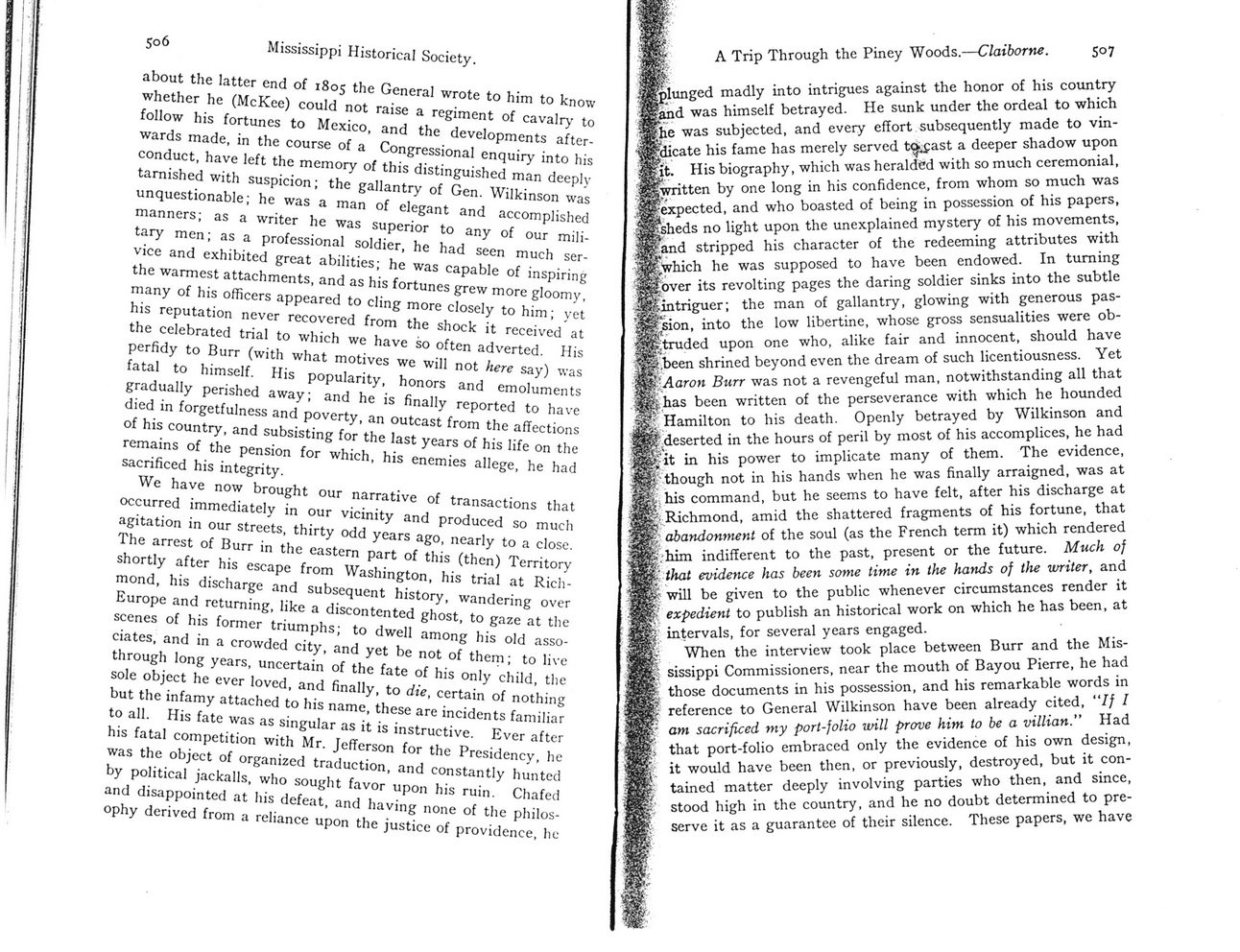This text was obtained via automated optical character recognition.
It has not been edited and may therefore contain several errors.
Mississippi Historical Society. about the latter end of 1805 the General wrote to him to know whether he (McKee) could not raise a regiment of cavalry to follow his fortunes to Mexico, and the developments afterwards made, in the course of a Congressional enquiry into his conduct, have left the memory of this distinguished man deeply tarnished with suspicion; the gallantry of Gen. Wilkinson was unquestionable; he was a man of elegant and accomplished manners; as a writer he was superior to any of our military men; as a professional soldier, he had seen much service and exhibited great abilities; he was capable of inspiring the warmest attachments, and as his fortunes grew more gloomy, many of his officers appeared to cling more closely to him; yet his reputation never recovered from the shock it received at the celebrated trial to which we have so often adverted. His perfidy to Burr (with what motives we will not here say) was fatal to himself. His popularity, honors and emoluments gradually perished away; and he is finally reported to have died in forgetfulness and poverty, an outcast from the affections of his country, and subsisting for the last years of his life on the remains of the pension for which, his enemies allege, he had sacrificed his integrity. We have now brought our narrative of transactions that occurred immediately in our vicinity and produced so much agitation in our streets, thirty odd years ago, nearly to a close. The arrest of Burr in the eastern part of this (then) Territory shortly after his escape from Washington, his trial at Richmond, his discharge and subsequent history, wandering over Europe and returning, like a discontented ghost, to gaze at the scenes of his former triumphs; to dwell among his old associates, and in a crowded city, and yet be not of them; to live through long years, uncertain of the fate of his only child, the sole object he ever loved, and finally, to die, certain of nothing but the infamy attached to his name, these are incidents familiar to all. His fate was as singular as it is instructive. Ever after his fatal competition with Mr. Jefferson for the Presidency, he was the object of organized traduction, and constantly hunted by political jackalls, who sought favor upon his ruin. Chafed and disappointed at his defeat, and having none of the philosophy derived from a reliance upon the justice of providence, he A Trip Through the Piney Woods.?Claiborne. 507 lunged madly into intrigues against the honor of his country and was himself betrayed. He sunk under the ordeal to which be was subjected, and every effort subsequently made to vin-Idicate his fame has merely served t^ast a deeper shadow upon it. His biography, which was heralded with so much ceremonial, written by one long in his confidence, from whom so much was expected, and who boasted of being in possession of his papers, sheds no light upon the unexplained mystery of his movements, and stripped his character of the redeeming attributes with 'which he was supposed to have been endowed. In turning over its revolting pages the daring soldier sinks into the subtle intriguer; the man of gallantry, glowing with generous passion, into the low libertine, whose gross sensualities were obtruded upon one who, alike fair and innocent, should have ?.been shrined beyond even the dream of such licentiousness. Yet ??Aaron Burr was not a revengeful man, notwithstanding all that "'has been written of the perseverance with which he hounded Hamilton to his death. Openly betrayed by Wilkinson and deserted in the hours of peril by most of his accomplices, he had ?it in his power to implicate many of them. The evidence, though not in his hands when he was finally arraigned, was at .his command, but he seems to have felt, after his discharge at ^Richmond, amid the shattered fragments of his fortune, that abandonrnent of the soul (as the French term it) which rendered ;him indifferent to the past, present or the future. Much of that evidence has been some time in the hands of the writer, and will be given to the public whenever circumstances render it expedient to publish an historical work on which he has been, at intervals, for several years engaged. When the interview took place between Burr and the Mississippi Commissioners, near the mouth of Bayou Pierre, he had those documents in his possession, and his remarkable words in reference to General Wilkinson have been already cited, ?If I am sacrificed my port-folio will prove him to be a villian.? Had that port-folio embraced only the evidence of his own design, it would have been then, or previously, destroyed, but it contained matter deeply involving parties who then, and since, stood high in the country, and he no doubt determined to preserve it as a guarantee of their silence. These papers, we have

Claiborne, J.F.H Claiborne-J.F.H-021